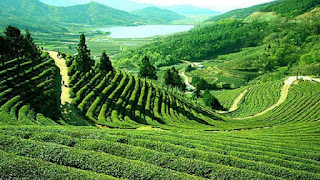JOGAN BEACH, Gunung Kidul's Tourism
JOGAN BEACH
Sunset was about to come when YogYES arrived at Jogan Beach. Surrounded by high cliffs such as those commonly found around limestone hills, Jogan Beach appears to be a melting point where the riverflow comes downhill to meet the waves that roll to the offshore. From tens of beaches spread along the 71 km distance along Gunungkidul coastal line, Jogan Beach sits on a special spot as it has a waterfall that falls directly from the cliff to the sea, reminding us of McWay Beach Waterfall in California. All these times, there has been only few tourists who have known about Jogan Beach. Located to the West of Siung Beach, Jogan has been often ignored by those climbers who are just too curious to hold the beautiful cliffs at Siung Beach.
It takes about two hours from Jogja to Jogan Beach, riding along the smooth asphalt road which seems like waves between the karst hills that were formed since millions of years ago. Having arrived at the Retribution Checkpoint at Siung Beach means that Jogan Beach is just minutes away; about 400 m from the checkpoint, you will see a wooden direction board that will lead you to Jogan. From there, the asphalt road is replaced by rocky path, guiding you to pass along while being guarded by two small rivers at the left of the road, which will eventually meet at the end of their flow and form a waterfall. Sad it is that the wavy river can only be seen during the rainy season; during the dry season, the water debit decreases greatly, added by the local folks taking away the water for their daily needs.
To enjoy the waterfall from above the cliff, we will need to go downhill. There are two ways to go down, eithers by canyoning or rappelling within the waterfall-which definitely requires adequate equipment and skill-or by walking down the wet slippery steps. Though the steps are secured by supporting wooden bars, it clearly takes carefulness to pass along since the path is just steep. Succeeded in passing the slippery steps, you will need to face another challenge-the corals inhabited by thousands of transparent crab newborns, about 5 mm in size. This is not a red crab colony like the one inhabiting Christmas Island (which is located close from West Java but belongs to Australia), but it certainly is not a simple thing to do to walk among them while your feet are bare. The local folks usually take the crab newborns to be cooked and processed into a kind of chip to serve with warm rice during rainy season. If you are lucky enough, you will probably also find hundreds of butterflies around the dry rocks.
And there you are; with the sunset horizon as the background, you can throw your glance to the offshore of Indian Ocean and watch as Poseidon throws the rolls of waves which seem like open mouths, while the sound of the waterfall roars behind your back as the water falls heavily. Do not be frightened; just enjoy the water splashing as you step your feet on the corals, friendly welcoming you before you open the water curtain and enter the waterfall. Showered by the fresh plain water flowing from the hidden karst hills will probably make you even think that the drought in Gunungkidul is maybe just a myth, since the region owns numerous water resources which, if not to say too bad, are hidden deep under the earth.
Jogan Beach is a freshness giver, just like an oasis in the vast white-sand beaches in Gunungkidul. It may also appear like garnishes on your plate, which is just too tempting to ignore. Jogan is the right beach for you to feel a different sensation from those typical beaches along the Southern regions of Jogja.
source : https://www.yogyes.com






Comments
Post a Comment